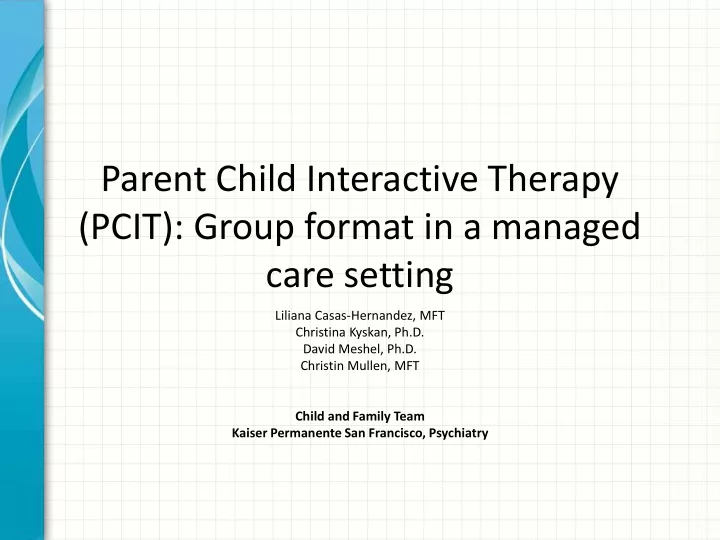

Parent Child Interactive Therapy (PCIT): Group format in a managed care setting Liliana Casas-Hernandez, MFT Christina Kyskan, Ph.D. David Meshel, Ph.D. Christin Mullen, MFT Child and Family Team Kaiser Permanente San Francisco, Psychiatry
Outline • Kaiser model – Nuts and bolts of the program – Rationale for hybrid format: group and coaching – Components of weekly parent group • Results and Limitations • Summary • Future considerations
Nuts and Bolts of our Program • Kaiser patients referred through child therapist • Four-month weekly program – up to seven families accepted • Screening packet: Parent depression, anxiety, ADHD, and *stress, substance use, abuse; child behaviors – *ECBI, *SESBI • Baseline session • Six coaching sessions (3 CDI/3PDI) • 90min group for parents only on non-coaching weeks • Final session – complete post-test measures, receive feedback * Outcome measures
Rationale for Hybrid Model • Hybrid – comprised of both individual coaching and group formats • Factors: 1. Time – insufficient for weekly coaching sessions, but still need weekly support and practice 2. Space – availability of rooms with one-way mirror 3. Support – decrease isolation and shame hearing from other parents with similar issues
Components of weekly parent group • Fridays 8-9:30am, parents only • Complete weekly check-in form • Each family shares what’s working and what’s not • Cross-family role-plays with different clinicians • Allow time for parental support of each other (modeling skills with each other)
RESULTS Our pre/post data found clinical significant improvements in PRIDE skills, ECBI and in the Total Stress Index Scale (PSI) N=57
ECBI Intensity 145.00 140.00 138.12 135.00 131.00 Clinical Significance 130.00 Cutoff 125.00 120.00 115.00 110.00 107.41 105.00 100.00 PRE POST Problem 16.00 15.45 15.00 Clinical Significance 14.00 Cutoff 13.00 12.00 11.00 10.00 9.45 9.00 8.00 PRE POST 1/ Pre assessments of the ECBI for the Intensity Scale surpassed the clinical significant range . Post assessments show that the Intensity level has fallen within the normal range . 2/ Pre assessments of the ECBI for the Problem Scale were in the clinical significant range. Post assessments show that the Intensity level has fallen within the normal range
PSI - Total Stress (Average) 94.00 93.50 93.00 92.00 91.00 90.00 89.00 88.00 87.00 86.00 Clinical Significance Cutoff 85.23 85.00 84.00 PRE POST Total Stress 93.50 85.23 Our results show that: The pre assessments measures for Total Stress index surpassed the clinical significance cutoff . The post assessment measures for Total Stress index shows that results are no longer clinical significant and are within the normal range that is expected.
PSI - PD, P-CDI, DC (Average) 45.00 40.00 39.89 (DC) 35.00 34.59 (DC) Clinical Significance 33.00 Cutoff 30.00 29.57 (PD) 26.71 (PD) Clinical Significance 26.00 26.15 (P-CDI) Cutoff 25.00 23.85 (P-CDI) 20.00 PRE POST 29.37 26.71 Parental Distress (PD) 25.13 23.85 Parent-Child Dysfunctional Interaction (P-CDI) 39.15 34.59 Difficult Child (DC) Even though the PD, PCDI scales were not clinically significant during the pre-test, we found a decrease in these same scales at post test. The pre assessment DC scale was in the clinically significant range. In post test, the DC was reduced and approaching normal range.
DPICS Pre & Post (Average) 25.00 20.00 Descriptions Reflections Praises Critical Statements & Questions 15.00 Mastery Baseline for Descriptions, Reflections, and 10.00 Praises 5.00 3.00 Maximum Baseline for Critical Statement & Questions 0.00 BASELINE MID (3rd CDI) Descriptions 1.98 6.87 Reflections 2.12 6.95 Praises 1.18 5.12 19.36 3.49 Critical Statements & Questions Even though the average of the total data shows that parents did not reach mastery after post assessments. Our data suggests that there was improvement in the acquisition of skills.
Anecdotal Support of the model We have post assessment data and anecdotal support for this hybrid model. Examples of Parents comments: “ The experience has made worlds of difference in how connected we feel with our child, in how thoroughly his behavior has improved at home and at school and in his increased satisfaction and comfort with his life… the opportunity to be part of a community working together, and to meet different clinicians, who each brought their unique perspective to the challenging task of behavior modification was also very valuable”. “We are thrilled with the results and with the tangible tools and concepts we are walking away with.”
Summary • Model works within an HMO setting • Significant improvement in clinical scales • Kaiser Members satisfied with PCIT group hybrid model • Parents feel connected to each other. • Steady supply of referrals. Outside referrals increasing (from community and other kaiser psychiatry depts)
Limitations of Our Program • Time limited approach. Not driven by mastery • Parents not following through with home practice consistently. • Spacing out of coaching sessions • Not a research based program. No administrative support. Data collected on our own time. • PCIT therapists also providing other non-PCIT therapeutic services.
Future Considerations • Work towards mastery of skills. a. Increase frequency of practice in group. b. Include coding during group c. Phone check in: “How hard will it be to do your “Home Fun” this week? d. consider different format of group – on rotating basis after meeting mastery move on. • Work in collaboration with the ASD clinic. • Offer model to our Spanish Speaking families.
Recommend
More recommend